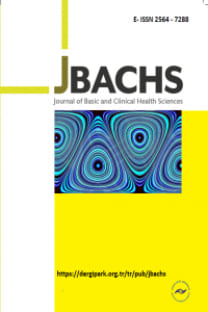Investigation of the anti-tumor effects of bevacizumab on glioblastoma cells
Aim: Glioblastoma multiforme (GBM) is the most malignant glial tumor. Angiogenesis which provides nutrient and oxygen support to proliferating cells plays an essential role in GBM development, proliferation, and metastasis. The development of antiangiogenetic agents is a promising treatment approach as blood vessels are essential for the vitality of tumor cells. For this purpose, in this study, the effects of bevacizumab on cell viability and apoptosis were analyzed using glioblastoma cells.
Material and method: U-87 MG and T98G cells were treated with various concentrations of bevacizumab for 24 hours, 48 hours, and 72 hours. Cell viability was analyzed after administration of bevacizumab. Cytotoxicity was determined using MTT. Apoptosis rate was determined with cell death detection kit.
Results: Cell viability analysis showed that when 8 mg / ml bevacizumab was administered to glioblastoma cells for 48 hours and 72 hours, cell proliferation was only 50% compared to proliferation of cells without bevacizumab. Additionally, apoptosis rates for U-87 MG and T98G cell lines treated with various concentrations of bevacizumab for 48 hours and 72 hours showed results similar to those of cell viability.
Conclusions: This study showed that while high concentration treatment of U-87 MG cells caused an increase in cell viability in a time-dependent manner, high dose treatment of T98G cells resulted in a decrease in cell viability in a time-dependent manner. This means that some glioblastoma cells can still survive under high doses of bevacizumab. This, in turn, demonstrated that glioblastoma cells developed resistance against bevacizumab.
Keywords:
Brain tumors, glioblastoma bevacizumab, apoptosis, drug resistance,
___
- References 1. Kanu OO, Hughes B, Di C, Lin N, Fu J, Bigner DD, Yan H. and Adamson C. Glioblastoma multiforme oncogenomics and signaling pathways. Clin Med Oncol 2009;3: 39-52.
- 2. Tanaka S, Louis DN, Curry WT, Batchelor TT and Dietrich J. Diagnostic and therapeutic avenues for glioblastoma: No longer a dead end? Nat Rev Clin Oncol 2013;10: 14-26.
- 3. Alifieris Dimitrios T. Glioblastoma multiforme: Pathogenesis and treatment Constantinos, Pharmacology & Therapeutics 2015;152;63–82.
- 4. Das S and Marsden PA. Angiogenesis in Glioblastoma. N Engl J Med 2013;369: 1561-1563.
- 5. Zhang J, Stevens MF, Laughton CA, Madhusudan S and Bradshaw TD. Acquired resistance to temozolomide in glioma cell lines: Molecular mechanisms and potential translational applications. Oncology 2010;78: 103-114.
- 6. Gilbert MR, Wang M, Aldape KD, Stupp R, Hegi ME, Jaeckle KA, Armstrong TS, Wefel JS, Won M, Blumenthal DT, et al. Dose-dense temozolomide for newly diagnosed glioblastoma: A randomized phase III clinical trial. J. Clin. Oncol 2013;31,4085–4091.
- 7. Stupp R, Hegi ME, Mason WP, Van den Bent MJ, Taphoorn MJ, Janzer RC, Ludwin SK, Allgeier A, Fisher B, Belanger K, et al. Effects of radiotherapy with concomitant and adjuvant temozolomide versus radiotherapy alone on survival in glioblastoma in a randomised phase III study: 5-Year analysis of the EORTC-NCIC trial. Lancet Oncol. 2009;10,459–466.
- 8. Clara CA, Marie SKN, de Almeida JRW, Wakamatsu A, Oba-Shinjo SM, Uno M, Neville M, Rosemberg S. Angiogenesis and expression of PDGF-C, VEGF, CD105 and HIF-1 in human glioblastoma. Neuropathology 2014;34,343–352.
- 9. Castro BA and Aghi MK. Bevacizumab for glioblastoma: current indications, surgical implications, and future directions. Neurosurg Focus 2014;37,6: 9.
- 10. Gugnoni M, Sancisi V, Manzotti G, Gandolfi G and Ciarrocchi A: Autophagy and epithelial-mesenchymal transition: An intricate interplay in cancer. Cell Death Dis 2016;7:2520.
- 11. Møller S, Grunnet K, Hansen S, Schultz H, Holmberg M, Sorensen M, Poulsen H. & Lassen U. A phase II trial with bevacizumab and irinotecan for patients with primary brain tumors and progression after standard therapy, Acta Oncologica 2012;51:6,797-804.
- 12. Chinot O, Wick W, Mason W, et al. Phase III trial of bevacizumab added to standard radiotherapy and temozolomide for newly diagnosed glioblastoma: Final Progression-Free Survival and Interim Overall Survival Results in AVAglio. Society of Neuro-Oncology, Annual meeting 2012.
- 13. Chinot OL, de La Motte Rouge T, Moore N, et al. AVAglio: Phase 3 trial of bevacizumab plus temozolomide and radiotherapy in newly diagnosed glioblastoma multiforme. Adv Ther 2011;28:334–40.
- 14. Huan H, Song J, Lıu Z, Pan L, and Xu G. Autophagy activation promotes bevacizumab resistance in glioblastoma by suppressing Akt/mTOR signaling pathway. Oncology letters 2017;15: 1487-1494.
- Yayın Aralığı: Yılda 3 Sayı
- Başlangıç: 2016
- Yayıncı: DOKUZ EYLÜL ÜNİVERSİTESİ
Sayıdaki Diğer Makaleler
Zeynep HASİMOGLU, Zübeyde ERBAYRAKTAR, Reşat Serhat ERBAYRAKTAR
Elit Genç Tırmanma Sporcularında Postür ve Kor Enduransının Değerlendirilmesi
Filiz ÖZDEMİR, Nisanur TUTUŞ, Melek Havva KILÇIK, Faruk ARSLAN, Hüseyin GÜRER, Faruk AKÇINAR
Didem DERELİ AKDENİZ, Mehmet OZTOP
Didem Dereli AKDENİZ, Mehmet Burak ÖZTOP
Sultan ÖZKAN, Hayriye Aktaş ÜNLÜ
Kevser Sevgi ÜNAL ASLAN, Edanur TAR
Didem KARADİBAK, Sema SAVCI, Buse Özcan KAHRAMAN, Karya POLAT, Gülbin ERGİN
Sami ERDEM, Kamile YÜCEL, Yavuz Turgut GEDERET, Ercan KURTİPEK, Taha Tahir BEKÇİ, Hüseyin KURKU
Naz KANIT, Nazlı Ecem DAL, Ufkay KARABAY, Erdener ÖZER, Gamze TUNA, Hüray İŞLEKEL
